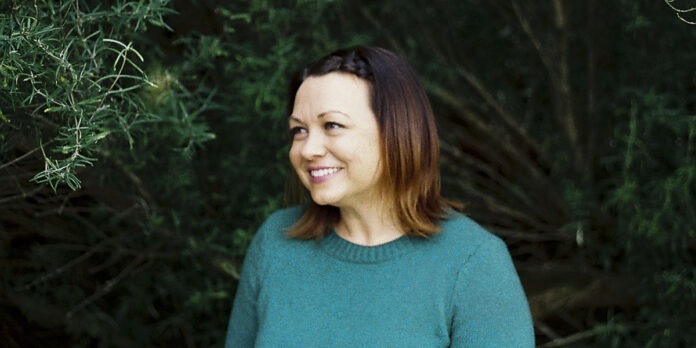West Clare based American writer, Tara Darlene Smith, has released a powerful new memoir exploring war, relationships, mental health and healing
“I knew nothing about Ireland at the time, I certainly never imagined that one day I’d be living here as a writer,” says Tara Darlene Smith as she reflects on the odyssey of releasing her first book.
Twenty years ago, in 2004, the then 22-year-old arrived at Shannon Airport as a US soldier en route to Iraq. The brief stopover gave her enough time to purchase a silver shamrock necklace in a green box labelled “Tara,” which she wore every day at war.
Thirteen years later, she returned as a civilian and a tourist to begin what she calls a “love affair with Clare”.
It has been, she says, “a journey of healing the traumas of childhood and of war” and “discovering a sense of peace I never thought possible”.
In her candid and gripping memoir entitled Sunflowers in Iraq, the 42-year-old Californian writer brings us into her world with remarkable depth and honesty.
Born and raised in the Sacramento area of Northern California, Tara spent her early years living amid a suburban landscape before finding some solace after moving north to the rural region of Siskiyou County.
“City life was hot and hectic,” she says, recalling her early years. “My childhood was chaotic, tumultuous, lacking in safety and stability.
However, the later more rural years were calmer, and I had a supportive community of friends around me so there were also moments of joy”.
Tara left home at 16 after “learning through repeated abuse that I needed to break away and find my own way forward”. She found work as a maid and a waitress. “It was a tough time. I was falling into debt and needed a way out”.
At 20, she encountered a military recruiter and found herself seduced by the promise of a secure income and the prospect of a college education. This was in the wake of 9/11, and she says, “There was also a sense of wanting to serve my country, to be part of something bigger. I can see now how war was normalised. Military commercials were everywhere on TV and radio when I was growing up. Recruiters visited our high school.”
Tara says that looking back now, she can join the dots and see how she was desperate to leave what was “an extremely stressful and painful way of life”.
“I couldn’t know then I was going to compound trauma with trauma and that I would join the military and end up leaving it as a shell of my former self. I made friends that became family in the military, but I was exposed to so much that I’ll never be able to un-see, un-know, and un-feel. The beautiful connections I made there did not balance out all the ways that war crushed my soul”.
“War is hell and a disgusting constant in human history. War changes you in ways you can’t fully comprehend until you’ve lived through it. I lose sleep trying to understand what it was all for.”
After her time in the military, Tara says staying alive became a daily struggle, something she says is a common experience for many veterans. “Sophie, my golden retriever, became my reason to stick around. Not for me, but so I could take care of her. Then I started going to one-to-one counselling and in groups, and equine therapy. All of that helped me to start coming back to life, but I had to accept that pre-war Tara died, and then I began to figure out who post-war Tara was going to be”.
Writing had played an important role in Tara’s life since childhood and she secretly harboured the dream of someday becoming a writer. Through therapy, she eventually worked up the resolve to enroll in Colorado State University’s Creative Writing programme. “I have always written in journals, since I was a little girl. Writing offered me an escape, a refuge, a way to make sense of the world”.
It was through writing that Tara felt called back to County Clare, a place she says, “has offered me a sanctuary for understanding and recovery, and for finding my voice”. It has she says, “been the place that birthed this version of the book, with stories that hopefully go beyond the airbrushed version of reality of social media. Ideally, they might offer insight for others who are experiencing their own traumas, loneliness, pain, or whatever demons they may be wrestling with”.
She says life near the sea over the past six years has been transformative. “It has changed me forever. The combined power of nature and community has helped me to heal. Like so many artists here, our craft is infused with the winds, rains, and waves of this place.
The creative vibrant community has given me an Irish family and filled my cup with love”.
What’s next for Tara? She’s not sure, but with a US book tour on the horizon and facing an “extremely stressful housing situation,” she knows that her Clare chapter is ending.
“I can’t say enough good things about Clare and its people, but I have to be honest about where I’m at at the moment. Like so many others, navigating years of temporary and insecure rentals has taken its toll on my nervous system,” said Tara.
“Constantly dancing between short-term and often sub-standard holiday rentals and Airbnb houses is draining. I’ve had to admit that it’s not viable to continue living here.
“Change is at my door once again as difficult as that is for me, I’ll embrace it and go forward with gratitude for my time on this special land”.
“What’s next I cannot say but I know I will write my way through whatever comes.
“Writing has gifted me with a sense of trust, faith, and conviction. We’ll see what blossoms from wherever I plant myself next. One thing is for sure, the Irish love I’ve experienced is in my bones now and will be with me wherever I go. That much I know”.
Sunflowers in Iraq is available as an audiobook and eBook and in print from shops across Clare including the Lahinch Book Shop, Banner Books and The Ennis Bookshop, as well as online at www.taradarlenesmith.com.
Andrew Hamilton is a journalist, investigative reporter and podcaster who has been working in the media in Ireland for the past 20 years. His areas of special interest include the environment, mental health and politics.


